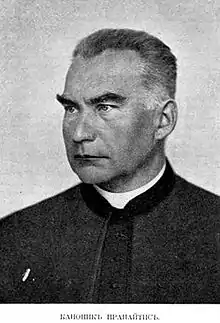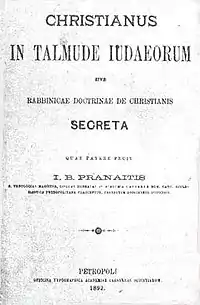Justinas Pranaitis
Justinas Bonaventura Pranaitis or Pronaitis[1] (27 July 1861 – 28 January 1917[2]) was a Russian Empire Catholic priest (subsequently defrocked),[3] Russian Master of Theology and Professor of the Hebrew Language at the Imperial Ecclesiastical Academy of the Roman Catholic Church in Saint Petersburg, Russia.

Early career
In 1894 Pranaitis was subject to legal proceedings on a charge of blackmail (for demanding 1000 rubles from a framing workshop in indemnification for a spoilt cheap picture which he claimed to be a picture by Murillo). For some time he was banished to Tver.[4] From 1902, he served as a priest in Tashkent.[2] He published an antisemitic tract called Christianus in Talmude Iudaeorum in Latin in 1892 under the imprimatur of the Archbishop Metropolitan of Mogilev, which was subsequently translated into Polish (1892), French (1892), German (1894), Russian (1911), Lithuanian (1912), Italian (1939), English (1939) and Spanish. The English translation of the book is titled The Talmud Unmasked: The Secret Rabbinical Teachings concerning Christians.
Beilis trial
Pranaitis rose to fame in the blood libel case of Menahem Mendel Beilis (or Beiliss[5]) in Russia in 1912, by which time he had already been defrocked as a Catholic priest.[3] Beilis was accused of murdering a Christian child to take his blood for alleged Jewish rituals, and for Matzah for Passover. Pranaitis was called as an expert witness to testify to the Talmudic hatred of Christians, as described in his book; one police department official is quoted as saying:
The course of the trial will depend on how the ignorant jury will perceive arguments of priest Pranaitis, who is sure about the reality of ritual murders. I think, as a priest he is able to talk with peasants and to convince them. As a scientist, who defended a thesis about this question, he will give props to the court and prosecution, though nothing can be guessed in advance yet. I became acquainted with Pranaitis and am firmly convinced that he is the person who knows the problem, about which he will talk, in depth... Everything, then, will depend on which arguments priest Pranaitis will furnish, and he has them, and they're shattering for Jewry.[4]

His credibility rapidly evaporated, however, when the defence demonstrated his ignorance of some simple Talmudic concepts and definitions, such as hullin,[5] to the point where "many in the audience occasionally laughed out loud when he clearly became confused and couldn't even intelligibly answer some of the questions asked by [Beilis'] lawyer".[1] Rebekah Marks Costin's account in Robert Garber's Jews on Trial quotes the key exchange of the trial which served to destroy Pranaitis' credibility:
Q: What is the meaning of the word Hullin [animals permissible as food]?
A: I don't know.
Q: What is the meaning of the word Erubin [Sabbath walking limits]?
A: I don't know.
Q: What is the meaning of the word Yebamot [family relationships]?
A: I don't know.
Q: When did Baba Batra live and what was her activity?
A: I don't know.[6]
The last question "was fatal once it was tactfully explained to the jury. Baba Batra is a tractate of the Talmud, quite well known to scholars, students, and many Jewish laymen."[6] A Tsarist secret police agent would later report on Pranaitis' testimony, saying:
Cross-examination of Pranaitis has weakened the evidential value of his expert opinion, exposing lack of knowledge of texts and insufficient knowledge of Jewish literature. Because of his amateurish knowledge and lack of resourcefulness, Pranaitis' expert opinion is of very low value.[4]
Beilis was found not guilty.
Later life
Pranaitis died in 1917 of heart disease.
See also
- Criticism of the Talmud
- Leo Frank
- Dreyfus affair
- History of the Jews in Russia and Soviet Union
References
- Scapegoat on Trial: The Story of Mendel Beilis - The Autobiography of Mendel Beilis the Defendant in the Notorious 1912 Blood Libel in Kiev, Beilis, Mendel, Introd. & Ed. By Shari Schwartz, CIS, New York, 1992
- Michael Hagemeister (2003). "Pranaitis, Justinas (Justinus Bonaventura)". In Bautz, Traugott (ed.). Biographisch-Bibliographisches Kirchenlexikon (BBKL) (in German). 21. Nordhausen: Bautz. cols. 1221–1226. ISBN 3-88309-110-3.
- Lindemann, Albert (1991). The Jew Accused: Three Anti-Semitic Affairs (Dreyfus, Beilis, Frank), 1894-1915. Cambridge University Press. p. 187.
- Царская Россия и дело Бейлиса, Tager, A., Moscow, 1934
- Blood Accusation: The Strange History of the Beiliss Case, Samuel, Maurice, Alfred A. Knopf, 1966.
- Garber, Robert, ed. (2004). Jews on Trial. Ktav. pp. 87–8.